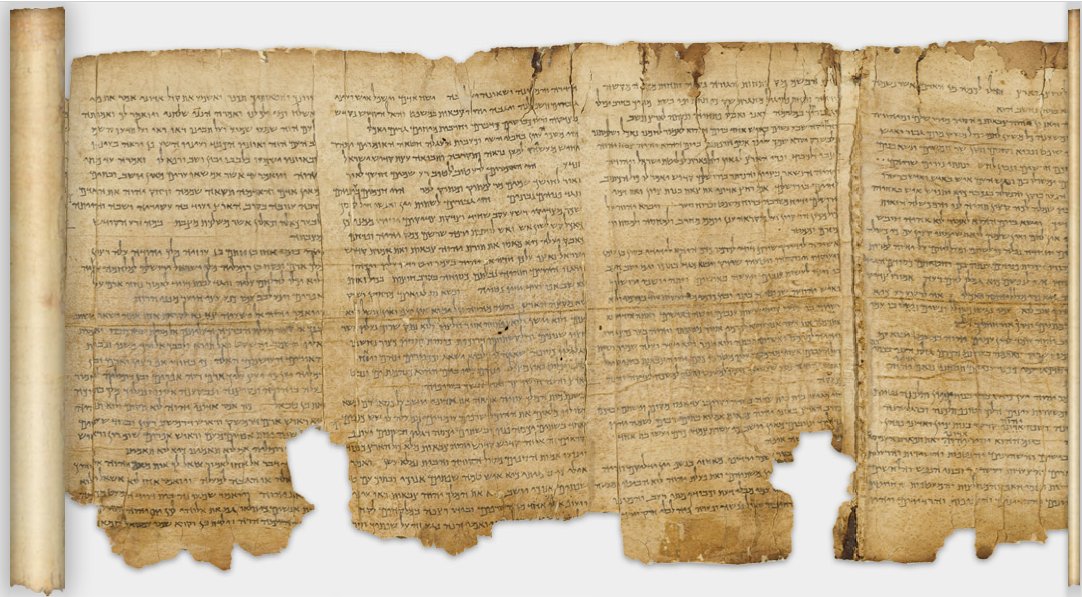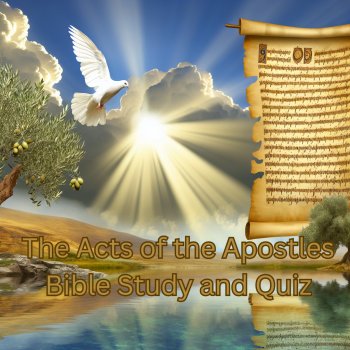Blog Post
Posted by Dion Todd March 25th, 2018 5,731 Views 0 Comments
RHM Bible Study, Acts, Chapter One from Refreshing Hope Ministries on Vimeo.
Today we are going to study Acts chapter 1 in depth. You can follow along in your own Bible if you like. I will be reading from the World English Bible because it is the only modern English translation that is copyright free, and I can read the entire bible on video without legal drama or breaking anyones rules.
After you finish this study, please take the accompanying quiz to test your knowledge. Thanks to everyone that has participated. Let’s get started:
The Acts of the Apostles, Chapter 1 beginning in verse 1, reading from the World English Bible: The first book I wrote, Theophilus, concerned all that Jesus began both to do and to teach, 2 until the day in which he was received up, after he had given commandment through the Holy Spirit to the apostles whom he had chosen.
The first book mentioned here is the gospel of Luke. Luke the gentile physician, a friend of the apostle Paul (Colossians 4:14, Philemon 24, and 2 Timothy 4:11), wrote both the gospel of Luke and the Acts of the Apostles to a man named Theophilus. He was thought to have been a wealthy Roman ruler who wanted to know the story of Jesus, and hired Luke to put it altogether for him. Luke researched, gathered testimonies and facts together, then wrote two books: the gospel of Luke, and the Acts of the Apostles. They were originally read as one book called: Luke / Acts. Word for word, Luke wrote more of the New Testament than Paul when you combine the 24 chapters of Luke, and the 28 chapters of Acts.
Being that Luke / Acts begins with the birth of Jesus and ends with Paul waiting for trial in Rome before Caesar, some believe that Luke prepared these scrolls as Paul’s defense. This would have been a span of about two years.

For some reason, the book of Acts has become a secret in the Bible, though it is the source code of early Christianity. Without it, we would know very little about the apostolic church and would only have the writings of Paul to go on. It is my belief that satan tries to keep the church away from Acts and from learning the truth. Too much time in our pulpits today is spent teaching fairy tales and good ideas, while the power and the truth about the Holy Spirit are nowhere to be found.
Acts is a continuation of the book of Luke. In Luke, the Son of Man offered His life; in Acts the Son of God offered His power. Many teach today that miracles are gone, that His power died with the last apostle. Acts will prove that Scripture does not teach that, that it is simply a lie from hell. For instance, Paul had never met Jesus or an apostle before he was suddenly converted on the road to Damascus, then filled with the Holy Spirit, and went on to raise the dead and write a lot of the New Testament. This was a spontaneous event that happened outside of the original circle of believers.
The study of Acts is particularly important to us because it teaches us how to experience a stimulating, exciting life as a Christin, how to make our lives count. Minister and writer Lloyd Ogilvie wrote, “I have been a deacon in my church for years; built a church building, raised money, served on committees. But one thing my church never gave me was a relationship with Christ that would make my life exciting.” Rather than having a life giving, relevant faith, this man found his life about as stimulating as a stale glass of ginger ale. He did not know the secret of Acts. In our day, one of the nicer things said about the institutional church is that it is “irrelevant.” The book of Acts carries the remedy for this.
Jesus never intended us to preach a powerless, watered-down religion. As we study the book of Acts, we will learn by their example, the way they lived. Acts spans a period of about thirty years, and takes us up to about 60 or 61 A.D., with Paul in Rome waiting to appear before Caesar Nero. This same Nero began his famous persecutions of Christians about 64 A.D.
3 To these he also showed himself alive after he suffered, by many proofs, appearing to them over a period of forty days, and speaking about God’s Kingdom.
Only Luke tells us that Jesus was on earth for forty days after His resurrection, and appeared to many. Evidently Jesus appeared at intervals, coming and going from Heaven at will, showing miraculous signs and instructing his disciples “about the kingdom of God.”
In 1 Corinthians 15:6 Paul wrote that more than 500 people saw the resurrected Jesus, and most of them were still alive some 25 years later during the days of his ministry.
4 Being assembled together with them, he commanded them, “Don’t depart from Jerusalem, but wait for the promise of the Father, which you heard from me. 5 For John indeed baptized in water, but you will be baptized in the Holy Spirit not many days from now.”
Jesus had told them about the Holy Spirit, the Comforter, the Helper that He would send when He left the earth. He told the disciples to wait in Jerusalem until they received the baptism of the Holy Spirit.
John 14:16-17 WEB “I will pray to the Father, and he will give you another Counselor, that he may be with you forever: 17 the Spirit of truth, whom the world can’t receive; for it doesn’t see him and doesn’t know him. You know him, for he lives with you, and will be in you.”
John 14:26 WEB “But the Counselor, the Holy Spirit, whom the Father will send in my name, will teach you all things, and will remind you of all that I said to you.”
John 15:26 WEB “When the Counselor has come, whom I will send to you from the Father, the Spirit of truth, who proceeds from the Father, he will testify about me.”
John 16:7 WEB “Nevertheless I tell you the truth: It is to your advantage that I go away, for if I don’t go away, the Counselor won’t come to you. But if I go, I will send him to you.”
The Holy Spirit was part of God’s plan all along. Put simply, the Holy Spirit means “Breath of God.” He is the aspect of God that lives inside of us. He empowers and inspires us, speaks to us and through us. The disciples would soon be filled with the breath of God and carry His presence wherever they went on the earth.
The idea of being baptized is to be immersed or covered over in something. Even as John baptized people in water, so these disciples would be “immersed” in the Holy Spirit. Jesus separated the baptism of water, which is John’s baptism, and the baptism of the Holy Spirit which was soon coming. They are not the same thing and you can have either one, without the other, or both. As we will learn, the house of Cornelius was baptized in the Holy Spirit and spoke in tongues, then later they were baptized in water.
6 Therefore when they had come together, they asked him, “Lord, are you now restoring the kingdom to Israel?”
The disciples were still looking for a political Messiah who would deliver Israel from the evil Romans and set up an earthly kingdom in their place.
7 He said to them, “It isn’t for you to know times or seasons which the Father has set within his own authority. 8 But you will receive power when the Holy Spirit has come upon you. You will be witnesses to me in Jerusalem, in all Judea and Samaria, and to the uttermost parts of the earth.”
Jesus did not rebuke them, but instead told them that it wasn’t for them to know the times or seasons that the Father had set. Then He told them that they would receive power when the Holy Spirit came upon them. It is possible that when Jesus spoke of power that they still thought too much of Caesar’s kind of power, and not enough in terms of God’s kind of power.
9 When he had said these things, as they were looking, he was taken up, and a cloud received him out of their sight. 10 While they were looking steadfastly into the sky as he went, behold, two men stood by them in white clothing, 11 who also said, “You men of Galilee, why do you stand looking into the sky? This Jesus, who was received up from you into the sky, will come back in the same way as you saw him going into the sky.”
While they were on the Mount of Olives watching, Jesus was taken up to heaven in a cloud of God’s glory and finally disappeared out of their sight. As they were looking up into the sky, two men, obviously angels, appeared to them and asked them why they were staring, for Jesus would return the same way as He had left. Jesus had told them to return to Jerusalem and wait for the coming of the Holy Spirit, so that is what they did.
12 Then they returned to Jerusalem from the mountain called Olivet, which is near Jerusalem, a Sabbath day’s journey away.
A Sabbath day’s journey was limited to around 3/4s of a mile or 1,000 yards. This was how far you could travel on the Sabbath day and not break the law of Moses, for the Sabbath was meant to be a day of rest.
13 When they had come in, they went up into the upper room where they were staying; that is Peter, John, James, Andrew, Philip, Thomas, Bartholomew, Matthew, James the son of Alphaeus, Simon the Zealot, and Judas the son of James.
No one knows for sure, but this may have been the same Upper Room where they had the Last Supper, for it reads “the upper room” and that is where Jesus had promised the Holy Spirit. It certainly was a large room because soon, 120 people were there.
14 All these with one accord continued steadfastly in prayer and supplication, along with the women, and Mary the mother of Jesus, and with his brothers.
Where the apostles had often bickered about who was the greatest, now they were in one place, and of one accord, in unity. In addition to the eleven apostles, there were Jesus’ own mother Mary. This is the last time that she is mentioned in Scripture. There were also Jesus’ “brothers” who thought that He was out of His mind, and the faithful women that had ministered to Jesus during his life on earth: Mary Magdalene, Mary of Clopas, Susanna, Joanna, Mary of Bethany, Martha (who was probably in the kitchen if there was one!), and many others. With such a crowd, there must have been times when it was difficult for anyone to hear anything. They all waited expectantly because Jesus had promised the Holy Spirit would come.
15 In these days, Peter stood up in the middle of the disciples (and the number of names was about one hundred twenty), and said, 16 “Brothers, it was necessary that this Scripture should be fulfilled, which the Holy Spirit spoke before by the mouth of David concerning Judas, who was guide to those who took Jesus. 17 For he was counted with us, and received his portion in this ministry.
Peter stood up and began speaking to the crowd for he was an early leader among the disciples. However, the idea that the authority of Peter was supreme and that he handed it down in unbroken succession until the pope today, is unbiblical and wrong. Peter was just one of the apostles, and he was later rebuked by Paul in Galatians 2:11. There was nothing “supreme” about Peter’s authority over the rest.
Instead of thwarting God’s plan, Peter said that Judas Iscariot fulfilled it when he betrayed Jesus. Now it was time to elect another apostle to take his place.
18 Now this man obtained a field with the reward for his wickedness, and falling headlong, his body burst open, and all his intestines gushed out. 19 It became known to everyone who lived in Jerusalem that in their language that field was called ‘Akeldama,’ that is, ‘The field of blood.’
Matthew 27:5 says that Judas went and hanged himself, but he apparently failed, possibly the rope broke and he was killed by the impact of falling from the tree. This happened in the Field of Blood. It was called a Field of Blood not only because Judas spilled his blood there, but also because the field was purchased with the “blood money” that was given him to betray Jesus. Two things are clear: Judas Iscariot died a violent death, and in some way he was connected to a plot of ground that was called the Field of Blood. Tradition has located this field near the Kidron valley.
20 For it is written in the book of Psalms, ‘Let his habitation be made desolate. Let no one dwell in it;’ and, ‘Let another take his office.’
Peter references two psalms written by David, Psalm 69:25 and Psalm 109:8.
21 “Of the men therefore who have accompanied us all the time that the Lord Jesus went in and out among us, 22 beginning from the baptism of John, to the day that he was received up from us, of these one must become a witness with us of his resurrection.”
They chose disciples who had been with them from the beginning when Jesus was baptized by John, until the day that Jesus ascended on the Mount of Olives and they came up with two names.
23 They put forward two, Joseph called Barsabbas, who was also called Justus, and Matthias. 24 They prayed and said, “You, Lord, who know the hearts of all men, show which one of these two you have chosen 25 to take part in this ministry and apostleship from which Judas fell away, that he might go to his own place.”
They narrowed the candidates down to Matthias and Joseph for the new apostle. They were both believed to have been part of the seventy that Jesus had sent out. The names here can seem confusing at first. For instance, Joseph was called Barsabbas as well as Justus. To better understand this, at the time, many Jews had a Hebrew name and a secular Roman name. In this case, the Hebrew name Barsabbas means “Son of the Sabbath” while Justus was his Roman name. In Acts 12:12 we read about “John, called Mark.” Again we have two names pointing to the same person, John being the Hebrew name, and Mark being the Roman name.
26 They drew lots for them, and the lot fell on Matthias, and he was counted with the eleven apostles.
Matthias became the twelfth apostle, replacing Judas Iscariot, the one who had betrayed Jesus. They first prayed, then used the time-honored tradition of “casting the lot” as in 1 Samuel 14:41. This was not an election. It was not a case of each disciple casting his vote, but of the choice being made at random.
The practice of casting lots is mentioned seventy times in the Old Testament and seven times in the New Testament. The precise method of casting lots is not known for certain, but it seems to have been the shaking of two stones together in a container, with a name written on each one. (Lev. 16:8) When one stone tumbled out, the name on that stone was taken to be the Lord’s choice. Luke’s expression is literally “the lot fell.” So Matthias was chosen and without anything further, he was numbered among the apostles. Casting lots is not mentioned anymore after the Holy Spirit came on Pentecost. He began to speak to and through people directly, but casting lots was a way to discern the will of God before the baptism of the Holy Spirit.
So we now have twelve apostles once again and they are all gathered together in the Upper Room.
This concludes today’s chapter of our ongoing Bible Study. Thank you for participating and being a part of Refreshing Hope! To complete this study, we invite you to test your knowledge with the accompanying quiz!

This blog post has an accompanying Bible quiz: Acts Chapter 1


